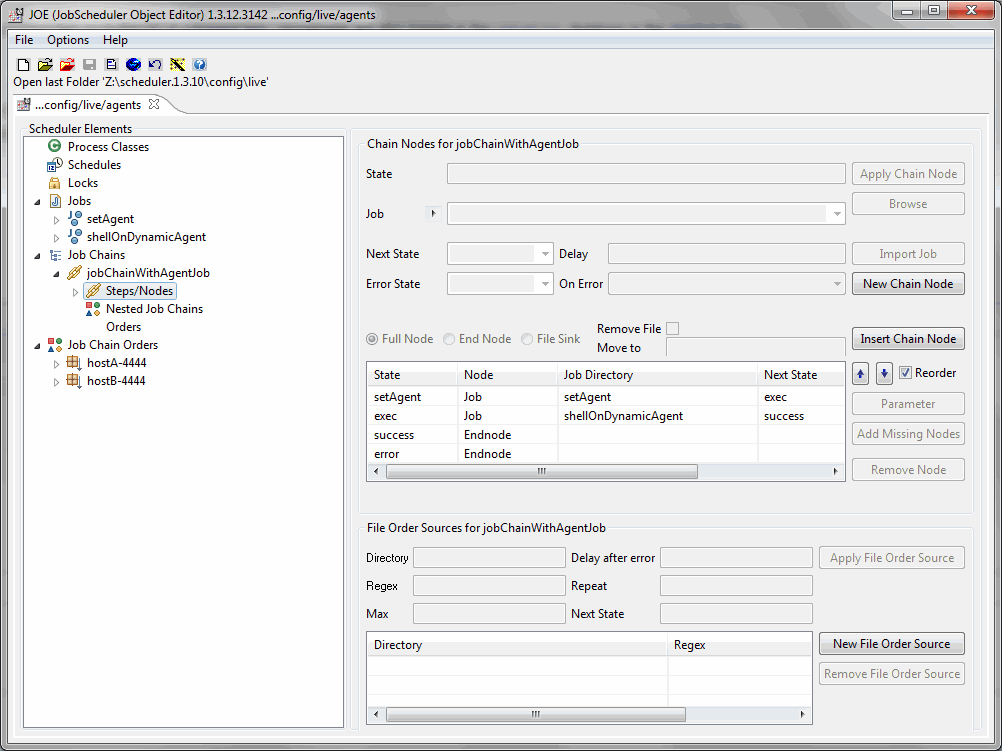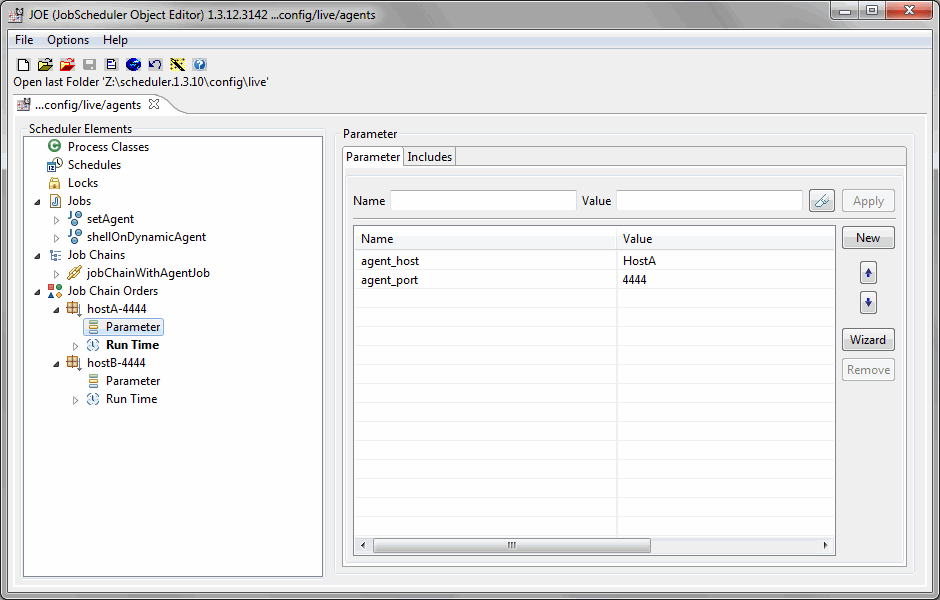We assume that we have a job in a job chain, to be executed on a JobScheduler Agent.
This requires a process_class that is assigned to the job.
Please read here to know how you create the process class for a JobScheduler Agent and how you assign it to a job.
Now we assume that we have multiple JobScheduler Agents and we want that a job executes on different JobScheduler Agents depending on parameters.
Create a process class (e.g. with the name _agents_) in JOE with empty values for host and port. The values for host and port are set dynamically. So you get the following configuration file ./config/live/agents.process_class.xml:
<?xml version="1.0" encoding="ISO-8859-1"?> <process_class max_processes="30"/>
Assign the process class to the order job in JOE. In this example the job is named shellOnDynamicAgent and calls hostname as shell command.
So you get the following configuration file ./config/live/shellOnDynamicAgent.job.xml:
<?xml version="1.0" encoding="ISO-8859-1"?> <job process_class="agents" order="yes" stop_on_error="no"> <script language="shell"> <![CDATA[ #! /bin/sh # returns the hostname of the agent hostname ]]> </script> <run_time/> </job>
Create the following job (e.g. setAgent) and put it into the job chain as the forerunner of the agent job.
This job change the process_class setting of the successor job in the job chain according the order parameter agent_host_ and _agent_port.
<?xml version="1.0" encoding="ISO-8859-1"?> <job order="yes" stop_on_error="no"> <params /> <script language="javascript"> <![CDATA[ function spooler_process(){ var curOrder = spooler_task.order; var agentHost = curOrder.params.value('agent_host'); var agentPort = curOrder.params.value('agent_port'); var nextJob = curOrder.job_chain_node.next_node.job; spooler_log.info("Params agentHost:agentPort = "+agentHost+":"+agentPort); spooler_log.info("before: "+nextJob.process_class.remote_scheduler); nextJob.process_class.remote_scheduler = agentHost+":"+agentPort; spooler_log.info("after: "+nextJob.process_class.remote_scheduler); return true; } ]]> </script> <run_time /> </job>
Put these jobs into a job chain (e.g. jobChainWithAgentJob)
So you have the configuration file ./config/live/jobChainWithAgentJob.job_chain.xml:
<?xml version="1.0" encoding="ISO-8859-1"?> <job_chain orders_recoverable="yes" visible="yes"> <job_chain_node state="setAgent" job="setAgent" next_state="callAgent" error_state="error"/> <job_chain_node state="callAgent" job="shellOnDynamicAgent" next_state="success" error_state="error"/> <job_chain_node state="success"/> <job_chain_node state="error"/> </job_chain>
Add an order to the job chain jobChainWithAgentJob for each JobScheduler Agent you want.
For example one agent is on HostA with port 4444 and another agent is on HostB with port 4444. The orders must have the parameter agent_host_ and _agent_port.
So you have the configuration files ./config/live/jobChainWithAgentJob,hostA-4444.order.xml and ./config/live/jobChainWithAgentJob,hostB-4444.order.xml :
<?xml version="1.0" encoding="ISO-8859-1"?> <order> <params > <param name="agent_host" value="HostA"/> <param name="agent_port" value="4444"/> </params> <run_time/> </order><?xml version="1.0" encoding="ISO-8859-1"?> <order> <params > <param name="agent_host" value="HostB"/> <param name="agent_port" value="4444"/> </params> <run_time/> </order>

